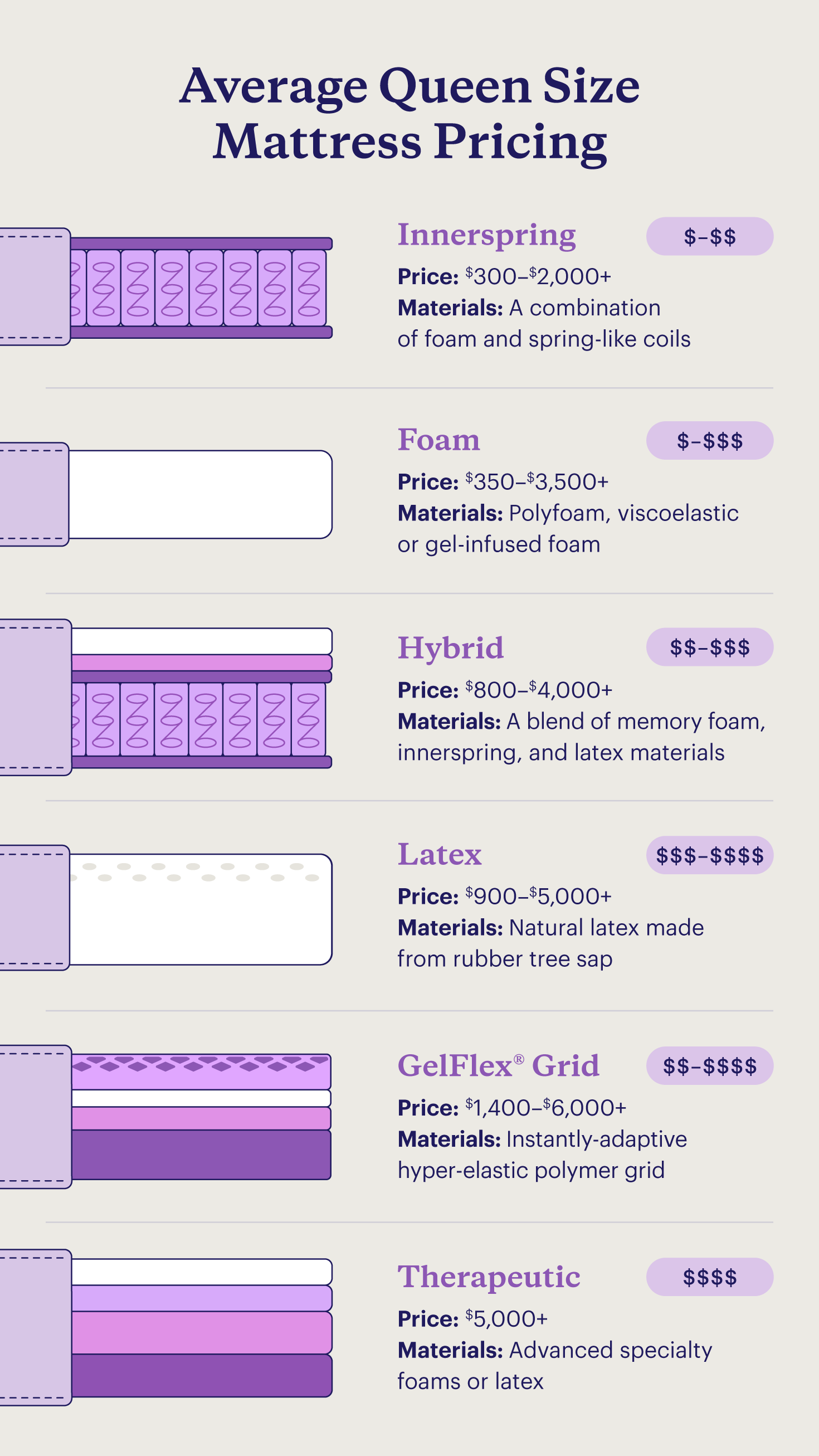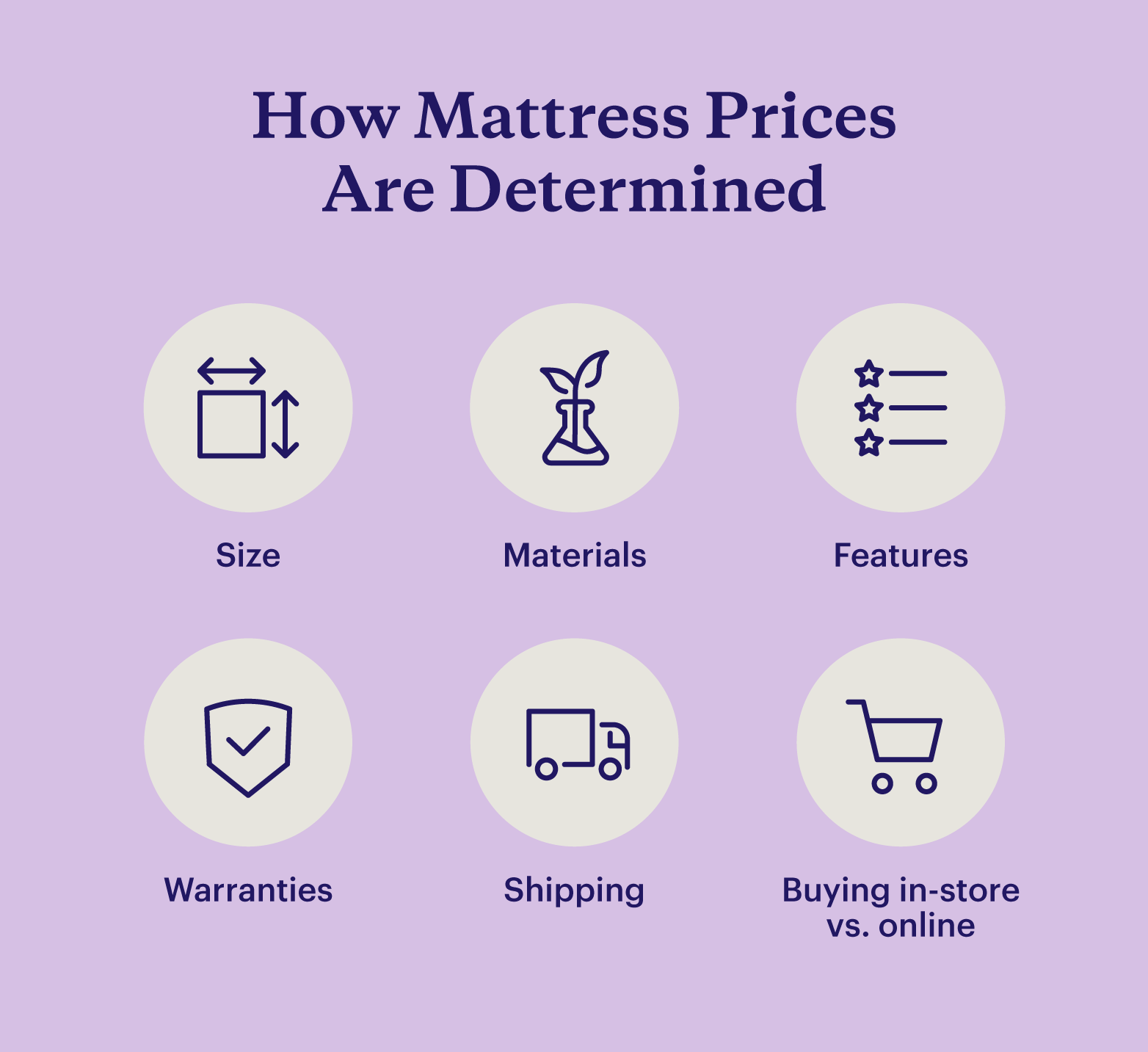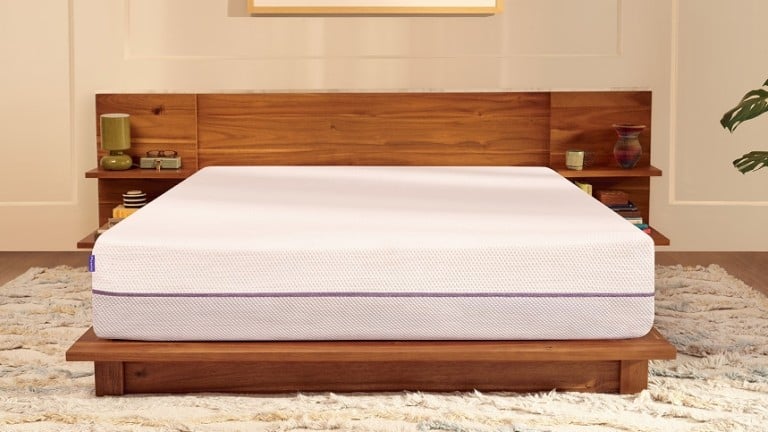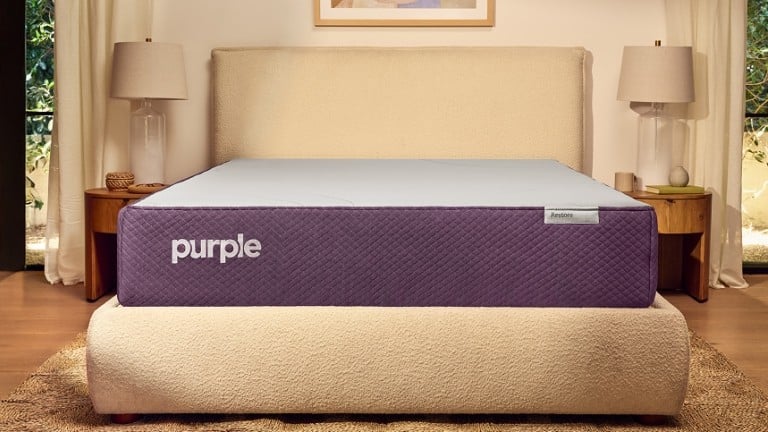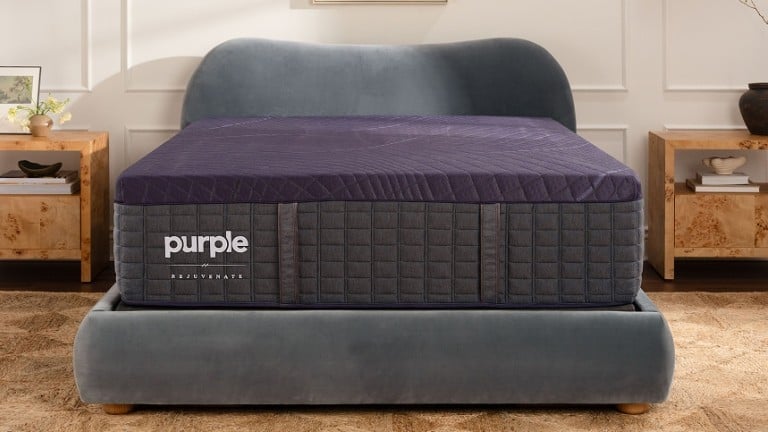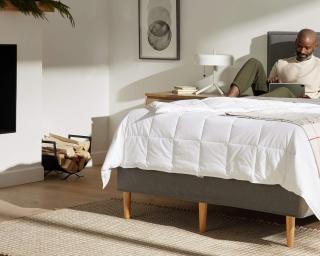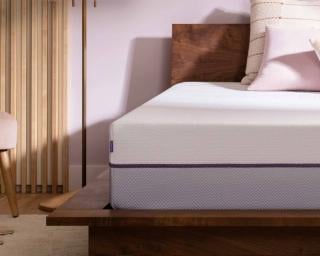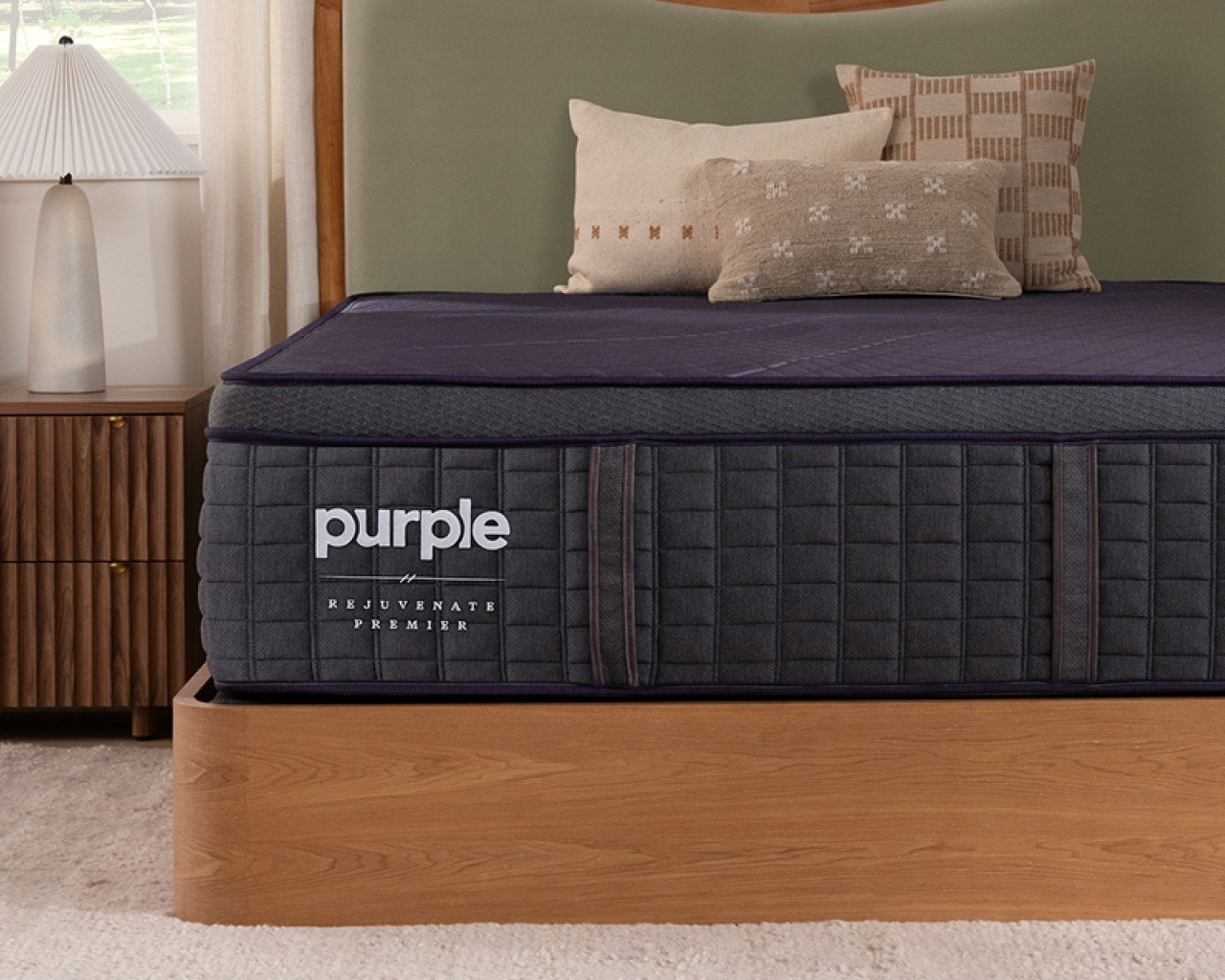
How Much Should You Spend on a Mattress? [2026 Guide]
How much does a mattress cost?
- On average, you can expect to spend at least $300 on a budget-friendly queen size mattress and over $5,000 on a therapeutic mattress. Your exact mattress price will depend on its size, materials, and construction.
- Mattress costs by size:
- Twin: $150-$2,500
- Full size: $250-$4,500
- Queen: $300-$6,000
- King: $450-$8,000
You deserve a comfortable mattress that promotes deep sleep and rejuvenating rest. But how much is a mattress going to cost — and how can you choose a mattress that's right for you?
If you're in the market for a new mattress, it’s important to consider how much a mattress costs. Between size, materials, and construction quality, many factors contribute to the price of a mattress.
A queen size mattress (the most popular size for couples) costs anywhere from $300 to over $6,000 — a wide range that shows the spectrum of contributing factors. For many people, a higher-priced mattress is worth the investment because of the higher material quality and sleep quality they’ll be able to enjoy.
If you need some guidance, you’re in the right place. Here is a general guide outlining cost differences by mattress type and size.
Mattress type | Twin bed price | Full bed price | Queen bed price | King bed price |
Innerspring | $150-$1,000+ | $250-$1,500+ | $300-$2,000+ | $500-$3,000+ |
Foam | $200-$2,000+ | $250-$3,000+ | $350-$3,500+ | $450-$5,000+ |
Hybrid | $300-$2,000+ | $500-$3,000+ | $800-$4,000+ | $700-$4,500+ |
Latex | $400-$2,500+ | $500-$4,500+ | $900-$5,000+ | $1,000-$6,000+ |
GelFlex Grid® | $800-$1,500 | $1,300-$3,000+ | $1,400-$6,000+ | $1,700-$8,000+ |
Therapeutic | $5,000+ | $5,000+ | $5,000+ | $5,000+ |
California kings and standard kings tend to be similarly priced, but double-check the cost and dimensions before buying a new mattress.
How Much Does a Mattress Cost? Average Mattress Price by Type and Size
Mattress price depends on various factors like size, materials, quality, durability, and more. On average, a queen size mattress ranges between $800 for a budget option and $5,000 for a premium mattress. Still, you can find some low-quality mattresses for less than $350 and therapeutic or luxury mattresses for over $5,000.
The type of mattress you prefer tends to have the most impact on price. Whether you’re looking for memory foam, innerspring, or hybrid, you’ll find that certain materials are more expensive than others. Mattress sizing also plays a big role — asking how much mattresses cost will get you much different answers when shopping for a twin mattress instead of a king mattress.
Innerspring
Innerspring mattresses consist of quilted foam or polyester fibers, along with the main ingredient: coils. The use of coils introduces better airflow and keeps the body cooler at night. Innerspring is typically more firm and supportive, which is optimal for those who sleep on their back or stomach.
Mattress type | Budget price* | Premium price* | Luxury price* |
Innerspring | $300+ | $900+ | $2,000+ |
*Price range for queen size mattresses.
Innerspring mattress prices vary by coil structure and material. As a rule of thumb, innerspring mattresses with a higher coil count are typically more expensive. One with a micro coil system costs upwards of $1,700. When comparing hybrid vs. innerspring mattresses, hybrid mattresses tend to offer more pressure relief, but at a higher price point.
Foam
A standard memory foam mattress has layers of foam that contour to your body. Foam mattresses can relieve pressure at common pressure points such as the hips, shoulders, and neck. Side sleepers and people who move around in their sleep often benefit from a memory foam mattress because the foam adapts to any position.
Mattress type | Budget price* | Premium price* | Luxury price* |
Foam | $350+ | $1,500+ | $3,500+ |
*Price range for queen size mattresses.
Foam mattresses primarily use polyfoam, viscoelastic, or gel-infused foam. Budget mattresses often use polyfoam, which is less durable and breaks down over time. Higher-end foam mattresses may use gel-infused foam to potentially offer some cooling benefits while you sleep.
Hybrid
Hybrid mattresses include a blend of coils and memory foam or latex. They look similar to a traditional innerspring mattress but are typically thicker, with high-quality and durable materials. They combine the best features of foam and innerspring mattresses, which make them perfect for virtually anyone. They're especially popular among couples with different sleep needs.
Mattress type | Budget price* | Premium price* | Luxury price* |
Hybrid | $800+ | $1,700+ | $4,000+ |
*Price range for queen size mattresses.
When comparing memory foam vs. hybrid mattresses, hybrid mattresses tend to be more expensive, with the most economical option costing more than the luxury option of a foam or innerspring mattress. This higher price is often justified due to the extra pressure-relieving and cooling features they offer, as well as the durability and quality of the materials used.
Latex
Latex is an eco-friendly and breathable alternative to memory foam that’s perfect for those who like memory foam but may want additional cooling, buoyancy, or firmness features. Latex mattresses are also typically much more durable than foam.
Mattress type | Budget price* | Premium price* | Luxury price* |
Latex | $900+ | $2,000+ | $5,000+ |
*Price range for queen size mattresses.
Many latex mattresses consist of materials derived from rubber tree sap. This natural material contributes to its higher price tag, but also makes the mattress more eco-friendly since it’s made from a renewable resource. Keep in mind that many latex mattresses are not suitable for those with a latex allergy.
GelFlex Grid®
Purple mattresses feature the innovative GelFlex Grid®, also known as a Gel Matrix™, a hyper-polymer grid engineered to cradle your body and provide the support you need to sleep soundly. With over 1,400 individual air channels, the GelFlex Grid® dissipates heat, keeping you cool with next-level comfort.
When comparing the Purple Grid vs. memory foam, you don’t have to worry about heat-trapping materials keeping you too warm at night. And with thousands of columns to support your pressure points, you get the right balance of stability and comfort.
Mattress type | Budget price* | Premium price* | Luxury price* |
GelFlex Grid® | $1,400+ | $2,200+ | $6,000+ |
*Price range for queen size mattresses.
Available at a range of price points, GelFlex Grid® mattresses combine comfort foam, pocket coils, and luxurious features to suit your needs and budget.
Therapeutic
Some mattresses support specific physical conditions, like chronic back pain, sleep apnea, and asthma, that make it difficult to sleep. As you may expect, therapeutic mattresses offer advanced features that cost more to produce than those made with basic materials.
These special-made mattresses can cost $5,000 or more. Still, many people who deal with chronic conditions that affect sleep health find them to be well worth it. After all, the best mattress for sleep apnea is one designed to cater to that condition.
What Factors Affect the Average Price of a Mattress?
Various factors determine mattress pricing. As with most things, the larger the mattress, the more expensive it will be. Mattress base pricing often starts with twins and goes up to king or California king. Some mattress materials also cost more than others. For example, traditional innerspring mattresses with coil structures don’t typically cost as much as hybrid mattresses. Special features like hypoallergenic materials and cooling capabilities often raise the price of your mattress as well.
There are other factors besides the mattress itself to consider. For example, a new mattress may require new bedding and furniture, especially if you’re getting a different bed size. Buying in-store may be more expensive than online. While this isn’t always the case, buying a mattress online is typically less expensive because it's direct-to-consumer and cuts out the need for a go-between or salesperson. Mattress weight can also impact shipping costs unless your retailer offers free shipping.
Purple mattresses are made in America, using high-quality materials and trusted processes to ensure you get the best mattress for your budget.
What Quality To Expect by Price Point
Quality | Price range* | Mattress types | Considerations |
Low-cost mattresses | $300 to $500 | Innerspring, all-foam | Lower upfront cost but may need to be replaced more often |
Budget mattresses | $500 to $1,500 | Foam, innerspring, some economic hybrids, and GelFlex Grid® | Limited features at a more affordable price point |
Premium mattresses | $1,500 to $4,000 | Latex, gel-infused foam, GelFlex Grid®, hybrid | Higher price point for more durable mattresses with some features |
Luxury mattresses | $4,000 to $6,000+ | Latex, hybrid, GelFlex Grid®, adjustable | Higher upfront cost for luxury features and longevity |
*Price range for queen size mattresses.
It’s no secret that mattresses are a significant purchase — and one that you’ll have to make more than a few times in your life. Because of this, when asking how much a mattress is going to cost, you need to consider the level of quality you’ll get at different price points. The lowest price may save you money upfront, but it isn’t necessarily the best choice in the long run.
“While it might be tempting to seek out the lowest price option, your sleep is critical to living your best life. Think about how much you can spend, and buy the highest quality mattress you can afford.
A higher-quality mattress will resist sagging, deliver better support, and offer pressure relief to keep you aligned and sleeping better.” — Kristen Olson-Turner, Senior Director of Product Merchandising at Purple
Low-Cost Mattresses
Innerspring and all-foam are the least expensive types of mattresses. While more expensive doesn’t always mean better quality, keep in mind that spending less than $1,000 for an innerspring or all-foam mattress means you might compromise on quality.
Mattresses in this price range often consist of inexpensive materials that are less responsive and supportive. In addition, lower price models typically last only five years, creating the need to replace mattresses more frequently.
Budget Mattresses
Many online mattresses are marketed as “budget” types within the $300 to $1,500 range for a queen size. Most mid-tier innerspring or memory foam mattresses fall into this range. You may also find an economical latex or hybrid mattress within this category — including some great options from Purple.
With the GelFlex Grid® and layers of comfort foam, the Purple Essential collection provides the pressure relief, adaptive support, and temperature balancing features you need most. Enjoy cooler, more comfortable sleep on an affordable mattress from Purple.
Premium Mattresses
The average mattress price for a premium mattress ranges from $1,500 to $4,000. You can find products made with eco-friendly or natural materials at this price.
Mattresses in this category typically boast more advanced features like gel-infused foam or latex to dissipate body heat. Hybrid mattresses like Purple’s Restore Hybrid collection are also available within this price range and serve as an excellent option for pressure relief and body-aligning support. Premium mattresses typically last between eight and 10 years with a longer trial period, warranty, and lifespan.
Luxury Mattresses
Luxury models come in at a higher price tag, usually starting around $4,000. They use durable, high-quality materials that provide extra cushioning or other advanced features.
Some luxury mattresses have clinically therapeutic effects, such as pain relief and posture correction. Luxury mattresses may be more suitable for allergy sufferers because they often contain hypoallergenic materials like cotton and bamboo.
Differences in Purple mattresses at the luxury level include soothing pressure relief, full-body support, and an indulgent feel designed to maximize your sleep quality. The Rejuvenate mattress collection offers next-level comfort with layered GelFlex Grid® and DreamLayer™ technology, active response foam, and responsive coils.
How To Save Money on a New Mattress
If learning the answer to how much a mattress costs is keeping you up at night, there are ways you can save. Here are seven tips for saving money while mattress shopping.
- Set a budget: Set a spending limit in advance, then decide which mattress type fits your needs and preferences. If your mattress supports a medical need, you might be able to use your Health Savings Account (HSA) or Flexible Spending Account (FSA) to help cover the cost.
- Do your research: Look online to find mattress options within your budget and read customer reviews.
- Compare prices: Some stores may offer deeper discounts on the model you’re interested in, depending on their inventory or promotions.
- Consider older models: Older mattress models may be sold at a clearance price if the store is trying to make room for new inventory.
- Look for online deals: Consider checking online and going into a showroom or store near you to see what kind of perks or deals they have available. Comparing the two options is likely to save you money.
- Time your purchase right: Mattress sales and markdowns come multiple times a year during national holidays like Labor Day and Memorial Day — not to mention big shopping holidays like Black Friday.
- Negotiate when buying in-store: If you’re set on purchasing in-store, speak candidly with the associate to learn what potential deals they’re willing to offer. You could also ask for a price match if you find the same model at another store or online for a lower price.
Discover Your Ideal Mattress With Purple
Remember, it’s not just about asking how much a mattress is going to cost. Buying a mattress is an investment in yourself and in your health, so the cheapest option is not likely the best choice. Always work within your budget to determine what you can afford, then pick the highest-quality mattress within that price range.
Purple mattresses are a great fit if you’re looking for a new mattress. We offer a wide range of mattresses to suit all budgets, while giving you access to industry-leading features like the cooling and supportive GelFlex Grid®. Our site makes it easy to find the mattress size, price, and features that best fit your needs and budget so you can enjoy a comfortable night’s sleep without stressing about your finances.
Average Mattress Price FAQ
A good mattress may cost anywhere from $900 to over $4,000 for a queen size bed, depending on the mattress type, bed size, and special features. Choosing a mattress that meets your unique needs is important, so you may spend more or less than the average cost for a durable, supportive mattress.
Most mattresses cost more than $300, so you may not get a high-quality bed unless you budget for more. While $300 may seem affordable, it’s important to consider that low-cost mattresses may not be as comfortable, well-made, or durable compared to other options.
Considering the average price range for a queen size mattress is between $300 and $6,000, $1,000 is actually on the lower end of the average price range, but sticker shock is a completely normal feeling when buying a mattress. If $1,000 feels out of your price range, consider looking for deals, waiting for sales, or saving until you can afford the mattress you want.
Most $1,000 mattresses are made from memory foam or innerspring systems. While both mattress types may start out comfortable, they are often less durable than other materials.
We estimate that an average mattress at this price can last between eight and 10 years, but it may be time to replace your mattress as soon as you notice sagging.
Purple mattresses are available at a range of prices depending on your preferred size, feel, and features. For a queen size Purple mattress, you can expect to pay between $1,400 and $6,000, though plenty of sales and discounts are available throughout the year.
More expensive luxury mattresses are often worth the price tag because they provide ample support, comfort, and exclusive features to promote better sleep.
Sleep is essential for your mental and physical health, as it helps improve brain performance and mood while reducing the risk for certain health conditions.1 A higher-quality mattress can often deliver the uninterrupted, restorative sleep that encourages a happy, healthy life.
Higher-quality mattresses also resist sagging and deliver better support for longer periods, reducing the quantity of mattress purchases needed throughout your life. There are many budget-friendly mattresses that provide comfort and support, but it’s important to confirm your needs and preferences, identify your budget, and do your research. This will determine whether a higher price tag is warranted for various models.
In short, yes! There are plenty of reasons someone might choose to finance a mattress. Whether you need a new mattress and don’t have the immediate funds or you’re just more comfortable with paying over time, plenty of financing options are available.
Whether you purchase in-store or online, most mattress companies will offer some type of financing option. For example, we offer quick and easy financing starting at 0% APR with multiple payment plans.
More To Explore
Level up your sleep routine with our most-loved products.


